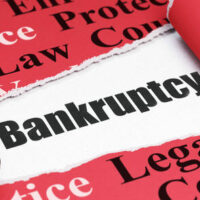What Are Exceptions To Discharge?

When you are planning to file for consumer bankruptcy in West Palm Beach, it is important to have a clear understanding of whether your debts can be discharged in your bankruptcy case. Discharges work differently in the various types of bankruptcy. For example, debts in a Chapter 7 case that can be discharged are discharged after four to six months from the date of filing, typically, while dischargeable debts in a Chapter 13 case can be discharged once the debtor has completed the terms of a repayment plan that will usually last from three to five years. When you are seeking information about debt discharges and bankruptcy discharges, you might come across the term “exceptions to discharge.” This language is in the U.S. Bankruptcy Code, and it refers to types of debts that cannot be discharged in a U.S. bankruptcy case.
What are the exceptions to discharge, and how could those exceptions affect your case? Our West Palm Beach bankruptcy lawyers will explain exceptions to discharge and how they work.
Learning About the Exceptions to Discharge
Under the U.S. Bankruptcy code, a bankruptcy discharge “does not discharge an individual debtor from any debt” that falls into the following categories:
- Tax or customs duty owed at a particular time or accrued as a result of tax fraud or tax evasion;
- Property or services obtained by fraudulent means, including luxury goods purchased within 90 days before the bankruptcy filing with the aim of having the debt discharged;
- Debts owed due to embezzlement or larceny, as well as debts accrued as a result of fraudulent actions while acting in a fiduciary capacity;
- Domestic support obligations;
- Debt incurred as a result of willful and malicious injury to another person or property;
- Government fines, penalties, or forfeitures;
- Student loans unless the debtor can show an undue hardship’
- Debts owed due to causing personal injury in an intoxicated driving case;
- Debts previously denied for discharge;
- Certain debts owed due to various forms of fraud or malicious or reckless behavior;
- Restitution owed under the criminal code;
- Money or property owed to a spouse or child following a divorce or separation agreement;
- Condominium association and homeowners’ association fees and related debt;
- Fees imposed on prisoners resulting from filing or court costs;
- Money owed to a pension, profit-sharing, or related plan; or
- Debt owed as a result of a securities violation.
There are other types of debt that also can be exceptions to discharge, and it is important to discuss them with a bankruptcy lawyer.
How These Exceptions to Discharge Could Impact Your Bankruptcy Case
If any of your debts fall into the above categories, or are otherwise not eligible for discharge, you will not be able to have those debts discharged through a bankruptcy case. Depending upon the number of debts you have that fall into the exception categories, you may need to work with a bankruptcy attorney on alternate debt-relief solutions.
Contact a West Palm Beach Bankruptcy Attorney
If you have questions or concerns about whether your debts can be discharged in a bankruptcy case, it is important to see advice from an experienced West Palm Beach bankruptcy attorney at Kelley Kaplan & Eller.
Source:
law.cornell.edu/uscode/text/11/523



